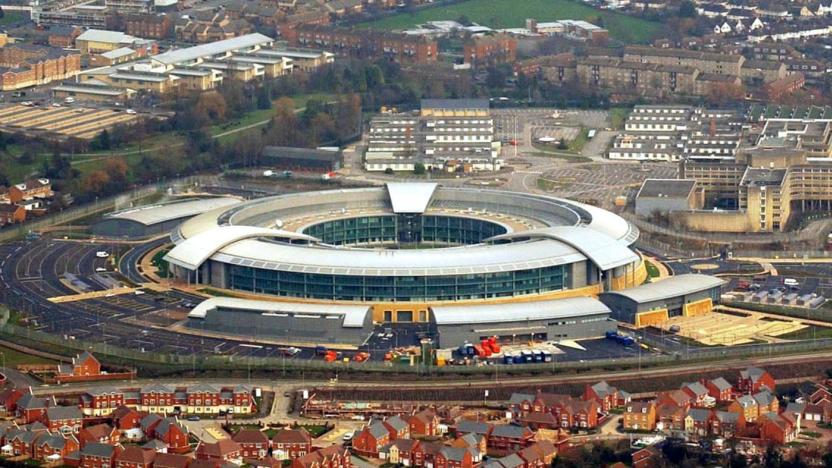ukgovernment
Latest

The UK buys a 45 percent stake in broke satellite startup OneWeb
It's part of the government's post-Brexit plan to replace the EU's sat-nav system.

UK proposal sets minimum age for drone use
The UK government could ban kids from owning drones weighing over 250g (0.55 lbs), under rules drawn up by the Department for Transport. The proposals suggest children could fly a heavier drone under adult supervision if someone older owns and has registered it. The age limit could be pegged at 18, partly because that's the minimum age for most insurance policies.

UK commits to full fiber broadband by 2033
Earlier this year, the UK hit its goal of broadband speeds of over 24 Mbps for 95 percent of users. Now, the country has a new goal. The Department for Digital, Culture, Media & Sport has set an ambitious goal for full-fiber (rather than copper) broadband for every home across the UK by the year 2033, with 15 million homes connected by 2025. The government also wants to give the majority of the population access to 5G cellular coverage.

Critics say UK EV policy doesn't do enough
As expected, the UK government revealed a raft of new measures yesterday designed to cut harmful emissions and promote EV adoption. The package, known collectively as the Road to Zero Strategy, builds on a pledge to ban sales of fossil fuel-powered vehicles by 2040. It includes a target or "ambition" to have at least half of all new car sales be "ultra low emission" by 2030. The government also announced its "intention" to make all new homes and street lighting with road-side parking come with EV charging points. The former requires a consultation, however, that will be launched "as soon as possible."

UK to review online trolling laws
Over the last nine months, the UK government has looked at various ways to make the internet safer for people across Britain. In October 2017, culture secretary Karen Bradley published an Internet Safety Green Paper, which discussed a voluntary levy on major social media companies to fund awareness and preventative activity against online trolls and in turn help users report threatening behaviour. Today, the Prime Minister -- supported by the Department for Digital, Culture, Media & Sport -- announced a new independent review "to make the UK the safest place to be online." It'll seek to clarify whether current laws are effectively treating online and offline behaviour the same.

The UK Prime Minister is creating an anti-fake news squad
In its most benign form, fake news can simply be clickbait designed to get eyes on banner ads. In other instances -- the one's governments are primarily concerning themselves with -- it's propaganda designed to invoke outrage and sway public opinion on elections and other important decisions. UK Prime Minister Theresa May has previously accused Russia of "seeking to weaponize information" by "deploying its state-run media organizations to plant fake stories and photoshopped images in an attempt to sow discord in the west and undermine our institutions." And now, she's taking action by creating a new specialist unit tasked with actively tackling fake news. What we're not being told, however, is how this anti-misinformation squad is supposed to do that exactly.

Google vows to pull ads from extreme videos and sites
Google has detailed new safeguards to ensure brands don't have their adverts served against extremist content. The measures follow a wave of complaints and advertising withdrawals by the UK government, Audi and L'Oreal, among others, triggered by a Times investigation which revealed a number of adverts being shown alongside harmful and inappropriate videos on YouTube. In a blog post, Google said it would be taking "a tougher stance" and "removing ads more effectively" from content that is attacking people based on their race, religion or gender. It also promised to hire "significant numbers" of new staff to review "questionable content."

UK government pulls YouTube ads over hate speech concerns (update)
The UK government has pulled adverts from YouTube after a report from The Times found they were running alongside extremist content. Ads for campaigns such as promoting blood donation and Army recruitment have been restricted after the apparent failings of Google's ad platform, which is supposed to work within guidelines set by the advertising party. Other UK brands, including Channel 4 and The Guardian, have also pressed the pause button on advertising with Google after learning their names were appearing alongside content from the likes of hate preachers and rape apologists.

UK government unveils its post-Brexit Digital Strategy
After a year of delays, the UK government has finally shared its plans for a more prosperous digital Britain. Unveiled by the Department for Culture, Media and Sport (DCMS), the Digital Strategy report outlines steps to plug skills gaps and deliver free training to people who need it, pushing forward important UK technology sectors like AI and allowing UK companies to remain competitive as they come to terms with life after Brexit.

UK government finally draws up laws for autonomous cars
Ever since the idea of autonomous vehicles began appearing on the roadmaps of major car makers, the UK government has made it clear that Britain can provide a strong platform for them to develop and test what they've built. Some projects, like the Lutz Pathfinder pod, are already underway, but questions have remained over who will be liable when autonomous modes are engaged on public roads. The 2016 Queen's Speech included a "Modern Transport Bill" that set out what needed to be done to support the introduction of driverless cars in the coming years. The document, which called for new and updated legislation, has now been worked on and finalised as the Vehicle Technology and Aviation Bill. In it, the government lists a number of proposals regarding how self-driving cars should be insured and suggests new rules requiring petrol stations (like Shell) and businesses to install more charging points for electric and hydrogen-powered cars. Most importantly, the government says insurance for autonomous vehicles in the UK will need to cover when the driver is in manual control and when the car is driving itself. It has been suggested that insurers will act as a middleman for manufacturers so that anyone injured by an autonomous car can claim against the owner's insurance and not have to file a private liability claim against the car maker. "This will mean innocent victims involved in a collision with an automated vehicle will have quick and easy access to compensation," the government said in a statement. The Bill also lays out instances where the owner will be at fault, even after engaging autonomous mode. If the owner has decided to modify the software on their vehicle or has failed to install important updates when their policy instructs them to, they will be made liable for any damages. It'll be down to the Secretary of State, by way of the Department for Transport, to decide which cars are covered by the new laws. "Automated vehicles have the potential to transform our roads in the future and make them even safer and easier to use, as well as promising new mobility for those who cannot drive," said Transport Secretary Chris Grayling. "We must ensure the public is protected in the event of an incident and today we are introducing the framework to allow insurance for these new technologies." To better assist the rising numbers of electric cars, the Vehicle Technology and Aviation Bill includes measures to increase the number of charging stations, but also force businesses to provide easy access to information regarding their location, hours of operation, fuelling options, cost (and methods of payment), charging methods (Tesla uses a different connector to Nissan, for example) and whether they are in use. Petrol stations and large businesses like supermarkets would be urged to provide points under the new proposals. Although true driverless cars are perhaps a few years away, the government believes that by acting quickly, car makers and developers of driverless technology will position the UK a leader in autonomous transportation. The Bill will now pass through Parliament, where ministers and third parties like insurers and vehicle makers can share their thoughts on how the UK's autonomous infrastructure should be built and maintained.

UK MPs launch inquiry into the impact of 'fake news'
What is fake news? That's a question that Facebook has been trying to answer for months, but it's now becoming the subject of a UK parliamentary inquiry. The House of Commons Culture, Media and Sport Committee confirmed today that it will launch an investigation into the "growing phenomenon" of fake news in a bid to define exactly what it is, who is impacted by it and the threat it poses to democracy.

UK ministers to discuss safe driving modes with phone makers
While lawmakers are doing their part to reduce the number of drivers making calls and sending texts while behind the wheel, ministers believe phone companies also have a part to play. According to The Guardian, government ministers are due to meet with representatives from the world's biggest smartphone makers early next year, urging them to introduce software that will limit the use of smartphones while a vehicle is in motion.

Britain's film board to enforce online porn age checks
The UK government is inching closer to a new piece of legislation that will require porn sites to introduce age checks. Such an idea has been kicking around for well over two years, but finally the Department of Culture, Media and Sport (DCMS) seems ready to implement it. An amendment to the Digital Economy Bill will give the British Board of Film Classification (BBFC) the power to block sites that fail to abide by the new rule. Should they find a porn provider breaking the law, they'll be able to contact ISPs, including mobile networks, and request that they restrict access.

UK calls for a taskforce to keep AI and robots in check
While artificial intelligence (AI) and robotics are starting to play a more valuable role in people's lives, a new report states that the UK is ill-prepared for an inevitable autonomous future. The House of Commons Science and Technology Committee said today that the UK government "does not yet have a strategy" for fostering AI and robotics or properly considered the "social and ethical dilemmas" they may pose.

UK government to double fines and points for texting drivers
In a bid to reduce the number of texting-related incidents on British roads, the UK government is set to double fines and points awards for those caught using their mobile at the wheel. The Department for Transport's new rules, which will be introduced in the first half of 2017, will impose a six point penalty with a £200 charge, which may require newly-passed drivers to retake their test.

Amazon teams up with the UK to make drone delivery a reality
Amazon has found a staunch ally in the British government in its quest to use drones for delivery. This new partnership with the UK gives the company a chance to test its drones the way it can't in the US. For one, the UK is allowing Amazon to deploy beyond line of sight tests in both rural and suburban areas. In the US, Amazon can only fly drones if they're within the pilot's line of sight, which makes it impossible to deliver parcels to farther locations. The e-commerce company will also use this opportunity to make sure its UAVs' sensors can identify and avoid obstacles and to deploy operations wherein one person controls multiple highly automated drones.

Researcher warns of backdoor in GCHQ-developed encryption
The UK government's spy agency stands accused of developing and promoting an encryption standard for voice calls which includes a backdoor, allowing it to conduct "undetectable mass surveillance." The protection is designed for internal software used by the British government, but because it's open-source one security researcher is worried it'll also be adopted by commercial companies. If that happens, the flaw could be exploited by GCHQ and, potentially, hackers to monitor the conversations not just of government employees, but the wider public. Dr Steven Murdoch, a Principal Research Fellow at University College London's Information Security Research Group, is concerned specifically about the way GCHQ's standard handles encryption keys. MIKEY-SAKKE, the security protocol behind the Secure Chorus encryption standard, relies on a set of master keys generated at the service provider level. These are used to protect each call session, but Murdoch says the master private key can also be used to decrypt users' conversations, past and present. "The existence of a master private key that can decrypt all calls past and present without detection, on a computer permanently available, creates a huge security risk, and an irresistible target for attackers. Also calls which cross different network providers (e.g. between different companies) would be decrypted at a gateway computer, creating another location where calls could be eavesdropped." Such a flaw, Murdoch believes, can be classified as "key escrow." That means a service provider would be able to comply with a British government request for "content," or what was said, during a particular individual or group's conversations. This ability to decrypt is in stark contrast to end-to-end encryption, which puts both public and private keys in the hands of the user. That way, even if a warrant is served, the company is unable to deliver the data in a readable format. A number of apps now offer this protection, including Apple's iMessage. Murdoch says he isn't surprised by the backdoor given GCHQ's responsibility to both monitor and protect the government's communications: "GCHQ designs the encryption technology used by government to prevent unauthorised parties having access to classified information. But GCHQ also wants the ability to examine how this encryption technology is used to investigate suspected leaks whether to companies, the press, or foreign intelligence agencies." The worry now is that the MIKEY-SAKKE protocol will be adopted by companies offering secure voice calls to the public. After all, "government-grade security" sounds like a pretty safe bet. GCHQ, however, is refuting Murdoch's claims. A spokesperson for CESG, GCHQ's Information Security arm (which developed the standard) told Engadget: "We do not recognise the claims made in this paper. The MIKEY-SAKKE protocol enables development of secure, scalable, enterprise grade products."

The UK government is getting its own 'Air Force One'
UK Prime Minister David Cameron and cabinet ministers are set to get their very own Air Force One under new government plans. Reuters reports that as part of a spending review due next week, Chancellor George Osborne will announce that £10 million will be spent on refitting a RAF Voyager A330 aircraft (pictured above), which usually operates as an air-to-air refuelling and transport aircraft, so it can be used for official government trips.

The UK is closing all of its coal power stations
The UK's last fifteen coal power stations are to be closed within the next decade under new government plans. In an announcement, Energy and Climate Change Secretary Amber Rudd confirmed that in a push for more "secure, affordable, and clean energy supplies," restrictions will be placed on all coal-powered installations by 2023, ahead of a full closure by 2025.

World's largest offshore wind farm to be built in the UK
When the UK government began pulling subsidies for onshore wind farms, it meant that private companies dedicated to harvesting renewable energy would no longer receive financial kickbacks when they sold their electricity to energy suppliers. The decision could have affected the UK's total wind-collecting footprint, but offshore wind farms have remained exempt, allowing companies like Dong -- Denmark's largest energy company -- to commit to new, massive installations in British waters. The company announced it is to build the world's biggest offshore wind farm in the Irish Sea, around 19 kilometres off the coast of Cumbria.





